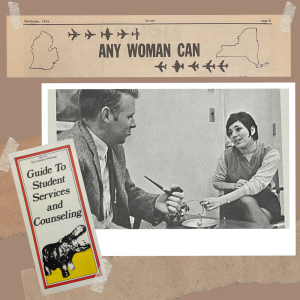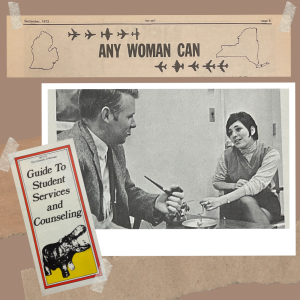How U-M Provided Abortion Care Before Roe: Archival research offers lessons for post-Dobbs era


September 2022
A new report provides historical insight on how administrators and counselors at the University of Michigan supported students, faculty, and staff seeking abortion care in the late 1960s and early 1970s, when abortion was illegal statewide.
U-M doctoral student Rianna Johnson-Levy authored the report, “Before Roe: The University of Michigan’s Task Force for Problem Pregnancy Counseling,” which is available online via the U-M Deep Blue repository.
Key findings from the project include:
-
The Task Force for Problem Pregnancy Counseling, formed in 1969, established problem pregnancy counseling and abortion referral services universitywide, connecting women with abortion clinics in legal states and coordinating their travel and care.
-
When abortion was illegal in Michigan, U-M doctors and clergy traveled to New York to evaluate abortion clinics’ safety and ultimately created a list of recommended clinics.
-
There was substantial enthusiasm on the Ann Arbor campus and amongst the university’s counseling staff for the Task Force’s work, which was designed not to assume a particular outcome for counselees, focusing instead on helping them reconcile and come to accept their own choices.
-
People who underwent problem pregnancy counseling and chose abortion were provided with information on the procedure they would receive and travel instructions for the clinic to which they were referred, but not funding.
Johnson-Levy, a Ph.D. student in History and Women’s and Gender Studies, conducted extensive archival analysis at the Bentley Historical Library with assistance from Bentley archivists Caitlin Moriarty and Aprille McKay. The project was sponsored by the Institute for Research on Women and Gender (IRWG), a unit based in the Office of the Vice President for Research, in partnership with the university-wide Post-Roe Campus Community Working Group.
The archival materials demonstrate how members of the Problem Pregnancy Task Force worked with the support of university administrators, openly advertised their services, and were understood to be a critical service in support of student, faculty, and staff wellbeing. The effort was led by directors of U-M’s Office of Religious Affairs and University Health Service (UHS), and guided by a national network of progressive clergy members. The work of the Problem Pregnancy Task Force continued following the legalization of abortion in the state in 1973, as they used their expertise and experience to improve the procedures and conditions of Southeast Michigan’s fledgling abortion care centers.
“It’s fascinating to learn how administrators at Michigan mobilized for abortion access in New York decades ago, when so many things were different, such as the politics of abortion, the role of religious leaders, and the caretaking role of the university,” said Professor Anna Kirkland, the Kim Lane Scheppele Collegiate Professor of Women’s and Gender Studies who sponsored this project during her tenure as IRWG executive director.
“And yet we see a lot of the same issues that the current Task Force on abortion access is taking up decades later. Principally, how can we care for the wellbeing and rights of our students, staff, and faculty when constitutional abortion rights don’t exist?”
In May, U-M launched a universitywide task force on abortion-care access to help mitigate the impact of a potential statewide abortion ban in Michigan. A ban has potential impacts across all U-M missions, including health care at Michigan Medicine and University Health Service, medical education and other areas. U-M Public Affairs maintains a webpage with updated information about abortion care access at the university.
Johnson-Levy will present findings from her project on September 28 at “Before Roe: The History (and Future) of Abortion Access for University of Michigan Students,” which is open to the public and will be held at Palmer Commons. The 4 p.m. event also will be livestreamed on Zoom.
Following Johnson-Levy’s presentation, Kirkland will moderate a discussion with Dean of Students Dr. Laura Blake Jones, and Dr. Christine Asidao, Associate Director of Community Engagement and Outreach for U-M’s Counseling and Psychological Services.
